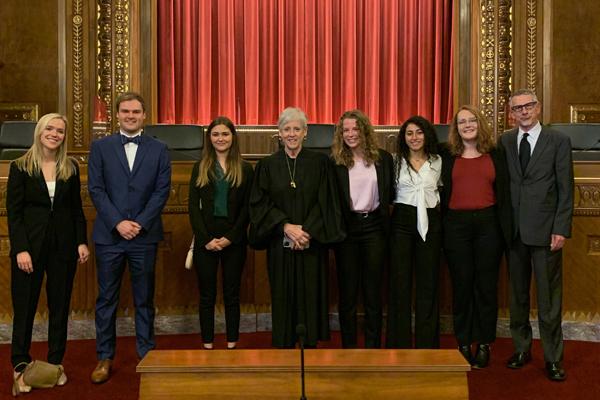Earn credit getting on-the-job experiences beyond the classroom.

Sociology Pre-Law Major B.A.
The Sociology Pre-Law B.A. is offered on OHIO’s campuses and online. It prepares students to work with diverse populations and understand the social and legal processes and institutions through which individuals, families and communities receive justice in multicultural societies.
Why Study Pre-Law and Sociology?
The Sociology Prelaw Major provides a strong foundation for students who wish to attend law school or pursue careers in law-related fields. Career opportunities include work in government, public service professions, non-governmental organizations, community justice navigation, mediation, social justice organizations, public policy institutes, criminal justice organizations, court administration, offender rehabilitation, prisoner reentry programs, and restorative justice.
The curriculum prepares students to work with diverse populations and understand the social and legal processes and institutions through which individuals, families and communities receive justice in multicultural societies. The program provides students with the necessary skills required for success in law and law-related fields, including research methods, critical thinking, analytical writing, public speaking, processing large texts, ethical decision-making, problem solving, and public service.
The pre-law major in the Sociology and Anthropology Department is designed to give students a solid foundation for successful careers in law and law-related fields. Coursework combines training in social inequality and working with diverse populations with the rigorous study of the processes and institutions through which individuals, families and communities address problems and receive justice in multicultural societies. Students also develop skills in research methods, analytical reasoning and writing, ethical decision-making, problem solving, and public service.
With a Sociology Pre-Law Degree...
-
Intern
-
Build Professional Connections
Engage with Appalachia communities in volunteer work and develop your professional network.
-
Start Your Career Now
Develop your pre-career specialization from the get-go with this pre-law degree.
-
Be a Change Maker
Because the world doesn't need you to just navigate change. It needs you to lead it.
How Is this Program Different from other Sociology Majors?
Focus
The Sociology-Pre-Law degree and Sociology-Criminology degree share similarities in terms of the core courses in sociology, research methods, statistics, and a capstone, but they differ in their different specific focuses and course requirements that reflect their respective career paths in law and law-related fields or criminal justice and related fields.
Coursework
The Sociology Pre-Law degree includes a pre-law concentration, which includes coursework that instructs students about how law and legal institutions function in social contexts (including Access to Justice, Sociology of Courts, Law in Societies); areas of concern for students interested in working with specific groups and issues (including Violence Against Women, Veterans and Society, Sociology of Mental Illness); and situational ethics (Ethics in Law, Crime, and Justice). There is also a social inequality requirement that gives students the opportunity to deepen their understanding of issues relating to class, race, gender, sexualities, and place.
Career Fields
This degree prepares students for law school or for a broad range of careers in law-related fields such as court administration, offender rehabilitation, public policy institutes, and restorative justice. The degree aims to provide students with the skills necessary for successful careers in law, such as research methodologies, critical thinking, analytical writing, public speaking, ethical decision-making, and problem-solving. Students have access to the pre-law advisor as well as the sociology career advisor.
Learn more about OHIO’s three different undergraduate sociology degrees.
Hannah Louck's: Don't let imposter syndrome hold you back!
Core Sociology Courses
- SOC 1000 - Introduction to Sociology
- SOC 3000 - Development of Sociological Theory
- SOC 3500 - Elementary Research Techniques
Social Inequality Courses Sample
- SOC 3090 - Sociology of Appalachia
- SOC 3290 - Race and Ethnic Relations
- SOC 3300 - Sociology of Poverty
- SOC 3310 - Class and Inequality
- SOC 3730 - Sociology of Sexualities
- SOC 4700 - Sociology of Gender
Sociology Statistics Course
- SOC 2500 - Applied Statistics in Sociology and Anthropology
Join OHIO's Pre-Law Community
Admission Requirements
This program has no requirements beyond University admission and transfer requirements.
-
Tuition & Fees
OHIO is committed to your lifelong success through our Guarantee+, which offers fixed tuition and fees, a graduation plan and lifelong benefits to our students. We're continuously striving to make college more affordable and accessible, while maintaining the high quality and value of an OHIO education.
-
Financial Aid & Scholarships
Our Office of Student Financial Aid and Scholarships provides services to students and parents both in-person and remotely. You can visit our office on the ground floor of Chubb Hall or reach us at financial.aid@ohio.edu or 740.593.4141.
Ready to Get Started?
Related Programs
-
Sociology Major B.A.Studying sociology provides you with a comprehensive understanding of society and the human experience as you learn about diverse cultures, social norms and values, and historical and contemporary social trends.
-
Anthropology Major B.A.An Anthropology degree prepares you for careers with governmental agencies, historical preservation offices, contract archaeology businesses, museums, forensics labs, zoos, primate centers, medical laboratories, and more.
-
Sociology MinorStudents who pursue a Sociology Minor often do so as an adjunct to their major in a discipline in another social science or in another field outside the College of Arts and Sciences.
